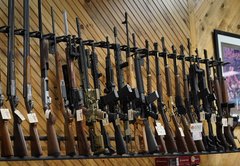Require background checks for all gun sales
Joe Biden
"Biden will enact universal background check legislation, requiring a background check for all gun sales with very limited exceptions, such as gifts between close family members. This will close the so-called 'gun show and online sales loophole' that the Obama-Biden Administration narrowed, but which cannot be fully closed by executive action alone."
Biden Promise Tracker

Compromise

